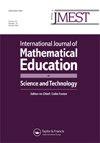社会正义信念量表的数学教学:教师教育的心理测量学与实践
IF 0.6
Q3 EDUCATION & EDUCATIONAL RESEARCH
International Journal of Mathematical Education in Science and Technology
Pub Date : 2023-05-01
DOI:10.1080/0020739X.2023.2204473
引用次数: 1
摘要
本文报道了社会公正信念教学数学量表(TMfSJ-B)的编制及其心理测量学性质。参加七所大学教师教育计划的职前小学教育教师完成了多项调查,旨在了解教学数学的态度和信念的演变。据我们所知,TMfSJ-B量表是唯一一个专门设计来衡量在职和在职教师对为社会正义而教授数学的信念的调查。验证性因子分析(n = 655)表明,TMfSJ-B量表是一种有效、可靠的数学教师教育社会公正信念评估量表,它包含三个因素:(1)所有学生的数学价值;(2)将社会正义融入数学教学;(3)数学及其与包容性的关系。本研究的目的是验证tmfsj信念量表所产生的测量方法,并讨论其在教师教育计划和研究中的潜在用途。本文章由计算机程序翻译,如有差异,请以英文原文为准。
Teaching mathematics for social justice beliefs scale: psychometrics and practices in teacher education
This paper reports on the development of the Teaching Mathematics for Social Justice beliefs (TMfSJ-B) scale and its psychometric properties. Preservice elementary education teachers enrolled in teacher education programmes at seven universities completed multiple surveys designed to understand the evolution of attitudes and beliefs about teaching mathematics. To our knowledge, the TMfSJ-B scale is the only survey specifically designed to measure pre- and in-service teachers’ beliefs about teaching mathematics for social justice. Confirmatory factor analyses (n = 655) provided here indicate that the TMfSJ-B scale is a valid and reliable assessment of beliefs about social justice in mathematics teacher education, with three factors: (1) value of mathematics for all students; (2) integration of social justice into mathematics instruction; and (3) mathematics and its relation to inclusiveness. The purpose of this study was to validate measures produced by the TMfSJ-beliefs scale and discuss its potential use in teacher education programmes and research.
求助全文
通过发布文献求助,成功后即可免费获取论文全文。
去求助
来源期刊

International Journal of Mathematical Education in Science and Technology
EDUCATION & EDUCATIONAL RESEARCH-
CiteScore
3.30
自引率
11.10%
发文量
123
期刊介绍:
Mathematics is pervading every study and technique in our modern world, bringing ever more sharply into focus the responsibilities laid upon those whose task it is to teach it. Most prominent among these is the difficulty of presenting an interdisciplinary approach so that one professional group may benefit from the experience of others. The International Journal of Mathematical Education in Science and Technology provides a medium by which a wide range of experience in mathematical education can be presented, assimilated and eventually adapted to everyday needs in schools, colleges, polytechnics, universities, industry and commerce. Contributions will be welcomed from lecturers, teachers and users of mathematics at all levels on the contents of syllabuses and methods of presentation.
 求助内容:
求助内容: 应助结果提醒方式:
应助结果提醒方式:


